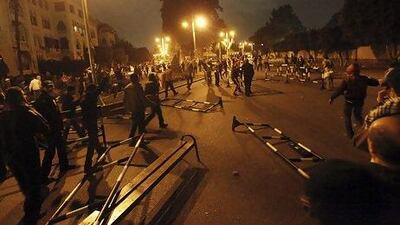CAIRO // Mohammed Morsi fled the presidential palace yesterday after protesters angry at his new powers broke past a security cordon while police fired tear gas to stop the situation from escalating.
The march to the palace in Cairo was dubbed the "last warning" protest against the president, who seized unrestricted powers last month and whose allies hurriedly adopted a draft constitution.
Mr Morsi was in the palace conducting business as usual while the protesters gathered outside. But he left for home through a back door when the crowds "grew bigger", according to a presidential official.
Thousands of protesters also gathered in Tahrir Square. "Freedom or we die," chanted a crowd of several hundred outside a mosque in the Abbasiyah district.
About 10,000 opponents of Mr Morsi also rallied in Alexandria.
The clashes at the palace came after twelve publications went on strike yesterday, stopping their presses for the day in response to what they say are growing infringements on freedom of expression by a government bent on establishing a new autocracy. Today, five television stations are expected to go off air as part of the coordinated protest by major media organisations - both state-run and privately owned.
The website of Egypt Independent, an English-language newspaper affiliated to the Arabic Al Masry Al Youm, blocked its content, leaving only a terse statement: "You are reading this message because Egypt Independent objects to continued restrictions on media liberties, especially after hundreds of Egyptians gave their lives for freedom and dignity."
Today, five television stations are expected to go off air as part of the coordinated protest by major media organisations - both state-run and privately owned.
In another sign of a widening polarisation, the Egyptian public prosecutor announced that three top opposition leaders would be investigated for "espionage" and "sedition" after a complaint from lawyer Hamed Sadeq.
The list of the accused read like a who's who of liberal and secular political figures: former presidential candidates Amr Moussa and Hamdeen Sabbahi, Constitution Party leader Mohamed ElBaradei, Wafd Party president Al Sayed Al Badawy and Judges Club head Ahmed Al Zend.
Mr Morsi said last month that he had temporarily taken on broad powers that were beyond the appeal of the courts. He said he was doing this to prevent a judiciary ridden with anti-revolutionary judges from dissolving a 100-member committee tasked with rewriting the constitution. Mr Morsi has been at odds with the judiciary since before he was sworn in as president, particularly after the supreme constitutional court dissolved the first democratically elected lower house of parliament in mid June because part of those elections were ruled to have been unconstitutional.
But a wide range of independent judges, liberal political parties and youth groups did not aceept the president's explanation. They saw the move as an attempt to monopolise power for Islamists.Mr Morsi is a former top official of the Muslim Brotherhood and was the head of its political arm, the Freedom and Justice Party, before taking office at the end of June.
Hundreds of thousands of protesters have taken to the streets on several occasions since Mr Morsi's declaration.
"The situation is volatile: an Egypt bitterly divided between Islamists and the rest of the country, opening the door for scenarios such as army intervention, a revolt of the poor, or even civil war," wrote Mr ElBaradei, the former head of the International Atomic Energy Agency, in an op-ed published in the Financial Times yesterday.
Amid the furore after Mr Morsi's declaration, the constitutional assembly fast-tracked the new constitution and approved it last week, despite more than 20 members resigning from the group to protest what they called the Islamist domination of the process.
Mr Morsi has called for a nationwide referendum on the constitution, where voters will simply vote yes or no, on December 15.
His government won a small but significant victory on Monday when the Supreme judicial council agreed to oversee the referendum, though some judges said they would not take part.
The referendum has presented a dilemma for opposition groups. The wording of Mr Morsi's November 22 declaration makes clear that his expanded powers will end if the constitution they oppose is passed, but he will continue to reign with near absolute control over the country if a vote is not held or if it is voted down.
"The political die is cast," said Nathan Brown, a professor at George Washington University in Washington, DC, who closely follows legal issues in Egypt. "The opposition will not regard the referendum as legitimate even if it were supervised by angels. And the president is determined to go ahead, come hell or high water."
Mounir Fakhry Abdelnour, a prominent member of the liberal Wafd party, said opposition groups would continue to protest in large numbers in a bid to force the president to back down.
"The only solution is for the president to rescind his declaration and go back to the 1971 constitution," he said.
bhope@thenational.ae
* With additional reporting by Associated Press
Follow
The National
on
& Bradley Hope on

